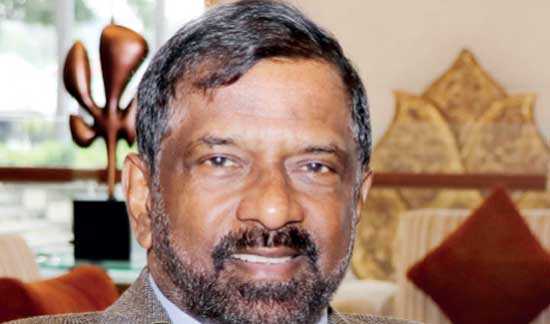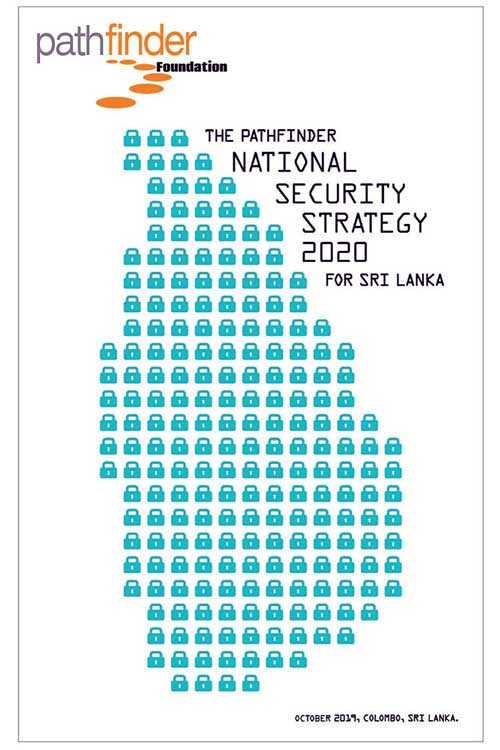Tuesday Feb 17, 2026
Tuesday Feb 17, 2026
Monday, 28 October 2019 00:00 - - {{hitsCtrl.values.hits}}
By Admiral Prof. Jayanath Colombage
Today, we live in a complex world vulnerable to multifaceted security threats. A single event affecting security could ruin and retard progress of a country for considerable period. The ‘Easter Bombings’ that took place in Sri Lanka six months ago are a case in point.
The country has not yet recovered fully, despite passage of half a year since the attacks. The economy took a severe beating and slowed down significantly. The mistrust created by the attacks among communities and the severely torn social fabric will take a long time to heal.

National security is foremost requirement of individual states. A sound national security policy is essential for a country to formulate an effective strategy in order to provide security to State, its citizens and institutions, which is solely a responsibility of Government.
Originally conceived as protection of State against external aggression, national security is now widely understood to include non-military dimensions, including security against transnational crime, both homegrown and foreign terrorism.
Sri Lanka has not experienced an external aggression since independence to the extent it threatened state’s existence. However, there have been numerous threats of serious nature to its national security by way of insurgencies in the south in the 1970s and 1980s and a violent armed movement seeking separatism that lasted almost three decades.
Having ended the separatist conflict in 2009, the country enjoyed a period of ‘relative peace’, which was shattered by the Easter bombings that took place in April. Following those attacks national security has emerged as a major point of discussion in the country.
Despite security challenges Sri Lanka had to face over the decades, the question that begs to be answered is, how did the political leadership fail to take steps to develop a national security policy all these years? Do we or do we not really need to develop such a policy even at this late stage?
What Sri Lanka needs at this juncture is a practical national security strategy, which will intertwine seamlessly with country’s national interests and security. Sri Lanka should not wait for another ‘Black Swan’ event to discuss, debate and agree upon national security policy
As Sri Lanka progressed through the protracted separatist conflict, there were numerous instances of inept policies and stratagems, which gave the initiative to the enemies of the State. Only during the period from 2005 to 2009, the country witnessed an effective military strategy and a well-coordinated plan of action, taking the initiative back into the hands of Government.
It effectively embarked on a ‘whole of country’ approach to fight the menace of terrorism and separatism, and soon the rebels were on the run, as they were unable to respond to onslaught of the armed forces. They soon lost hitherto enjoyed initiative and the luxury of choosing when and where to attack. The end came swiftly and decisively in May.
After a lapse of 10 years following the separatist conflict, the country was once again exposed to terrorist attacks, with hitherto not experienced devastation. One of the reasons for the carnage and destruction was not having in place a sound national security policy and a national security culture. 
Following the devastating bombings, it was clearly observed that terrorists enjoyed freedom to carry out activities such as recruiting, fundraising, training, and acquiring explosives with ease, without being hindered by law enforcement authorities.
They could also evade arrest and detention by law enforcement authorities as those agencies were not functioning in well-coordinated manner and worked in their own water-tight compartments. Worst still, there was no functioning apex body to receive intelligence reports or to give orders such agencies to take remedial action.
The first step towards preparing a sound national security strategy is to develop a well-designed national security doctrine, based on which strategy should be built. Today, the Indian Ocean, the environment upon which Sri Lanka must navigate, is in a dynamic state.
There are State vs. State threats, non-traditional threats posed by non-State actors and threats resulting from degrading ocean environment coupled with effects of global warming and rising of ocean temperature. Tools of globalisation, such as internet and social media, which help connect people and share information are being exploited by interested parties to carry out activities against State.
Furthermore, there is potential for serious damage to life and property from natural or man-made disasters. Sri Lanka needs to provide solutions to all these whilst upholding rule of law and respecting human rights.
What Sri Lanka needs at this juncture is a practical national security strategy, which will intertwine seamlessly with country’s national interests and security. Sri Lanka should not wait for another ‘Black Swan’ event to discuss, debate and agree upon national security policy.
In doing so, Sri Lanka needs to consider current and emerging trends in international power play, particularly in the Indian Ocean region. There is not much for the country to gain by taking sides and getting enmeshed in global or for that matter regional power struggles. Against this scenario Sri Lanka needs to develop clear principles about its military relations with foreign powers.
One of the recommendations made is that the country should refrain from establishing military alliances with foreign countries, stationing foreign troops on Sri Lankan soil and partnering with a foreign power against another. The Pathfinder NSS 2020 also recommends establishing a new National Security Council through a legislative process to replace the current entity established in 1999 under Emergency Regulations.
It is the hope of the Pathfinder Foundation that its National Security Strategy document would be scrutinised, studied and debated by policy makers as well as other entities such as think tanks and academics with the objective of helping to develop a sound national security doctrine and strategy for Sri Lanka.
(The writer is the Director of the Centre for Indo-Lanka Initiatives and Law of the Sea of Pathfinder Foundation.)